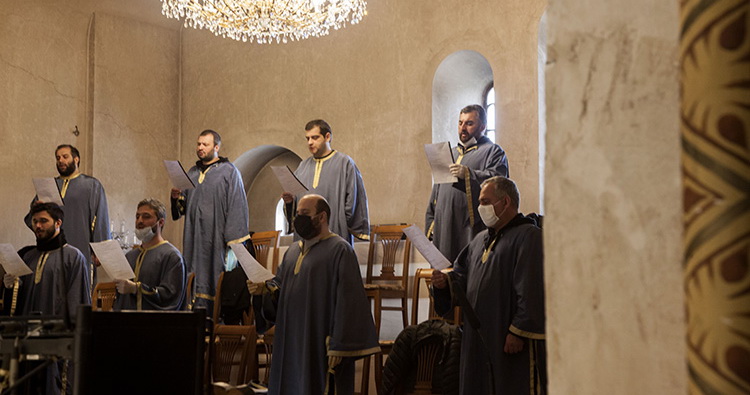Georgian religious hymns designated as intangible cultural heritage

The designation will help those working to preserve, promote and teach the tradition of ecclesiastic hymns in Georgia, the folklore centre said. Photo: Nino Alavidze/agenda.ge.
The tradition of Georgian religious hymns and ecclesiastic music has been designated as intangible cultural heritage of the nation, recognising the rich history and the living legacy of the canticles and chants preserved and performed across the country.
Completed on Monday, the assignment of the formal status to the tradition by the state comes as a result of work carried out by the Georgian State Centre of Folklore, a state institution working to preserve and promote polyphonic singing and religious hymns.
The news was announced by Prime Minister Irakli Garibashvili on Wednesday, with the head of the government praising the "milestone achievement" and offering his congratulations to the centre for its work in the project.
Polyphonic Georgian chant is one of the main symbols of our national identity [...] This great recognition will contribute to its protection, teaching and development [and] spark greater interest from the Georgian [and] international community, including the youth
- Irakli Garibashvili, Prime Minister of Georgia
Hear recordings of Alilo, a religious chant often performed on Orthodox Christmas in Georgia, through its versions from different parts of the country, via the folklore centre's page on the Audiomack platform:
In its message welcoming the development the centre said the tradition of Georgian ecclesiastic music and its performance was "one of the greatest symbols describing national identity of Georgian people" and marked both national origins and connections beyond historical borders.
Georgian chanting, on the one hand, is a national [tradition] [...] - on the other hand, [it makes the national culture's] close connection to European culture and Christian world [...] particularly obvious
- Georgian State Centre of Folklore
Marking what it called a "cultural treasure of significance for not just national [culture] but the entire Christian world", the folklore centre said the designation of the tradition with the intangible heritage status would help with "preservation of cultural values, passing it down from generation to generation".
Promoting the legacy to the young generations, sparking increased interest in the field among researchers and the wider public, and contributing to the teaching of the tradition are also among the centre's expected outcomes of the formal recognition of the national legacy of religious chanting.
Last year the folklore centre launched its page on the Audiomack platform, making hundreds of recordings of polyphonic folk music and ecclesiastic performances available for listening. The institution also has recordings available on its own website.
 Tweet
Tweet  Share
Share